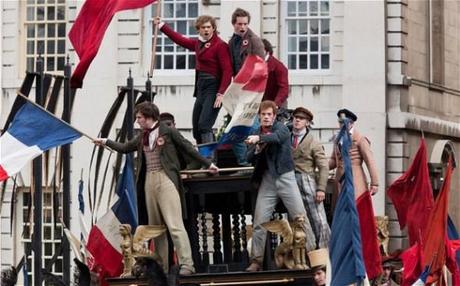
I am probably one of the only people in the civilised world who knew practically nothing about Les Miserables before going to watch the film. Of course I knew it was set in Paris, was where that Susan Boyle song was from, and was sad, but that was the sum total of my knowledge. The story was a mystery, the characters a mystery, and the obsessive love so many people seem to have for it a mystery. My mom is one of the latter people; she’s seen the musical loads of times and thinks it’s the best thing since sliced bread. As such, she was desperate to see the film, and so last weekend we trudged through the snow to our local cinema to enjoy the promised spectacle of Les Mis on screen. I had no idea what to expect, so prepared myself accordingly; as I am prone to inconvenient tears, I made sure I had a stash of tissues in my bag, and just in case there were any unpleasant bits, I took a scarf to hide behind. As the lights went down, I was quivering with anticipation; a roar of song met my ears, a breathtaking image of men pulling a huge sailing boat into dry dock met my eyes, and I was instantly enthralled. I don’t think I blinked for the next two and a half hours.
I was shocked at how quickly and cruelly Fantine’s life changed after she lost her job; how little choice she had, how little opportunity to change her lot. Juxtaposed to this, I was amazed at Jean’s ability to transform his life so completely from being nothing but a number to the most prominent man in his town; what inner strength, what courage he had. I was incensed at Javier’s inability to empathise with Jean and his lack of willingness to open his heart to other people. I was awestruck by the bravery of Marius and his friends, willing to lay down their lives to fight for the freedom of the ordinary people who were living under such oppression. I was moved throughout by the acts of kindness and selflessness that elevated ordinary people to the rank of the extraordinary. I loved the epic, sweeping scale of it all; so colourful, so passionate, so raw, so powerful. The realistically patchy singing made it even more intense; if it had been spoken in ordinary dialogue, it would have lacked so much of the soul that comes forth on screen. I felt like I was there, on those teeming, filthy, suffering filled streets of 19th century Paris. The two and a half hours flew by; I don’t think I’ve ever been so engrossed in a film.
I remained dry eyed throughout, but there was a very significant lump in my throat as the lights came up. I felt that I had been through an experience as I left the cinema, buoyed up on a renewed sense of faith in the essential goodness of the human race. A week later, I still find myself randomly bursting into song at inopportune moments, my eyes misting up at the memory of Jean and Javier and Marius and Cosette. I’d like to say that watching Les Miserables has made me a better, more selfless person; it hasn’t. But it has made me flirt with the idea of picking up Victor Hugo’s novel. Has anyone tackled this behemoth? Is it worth it?
